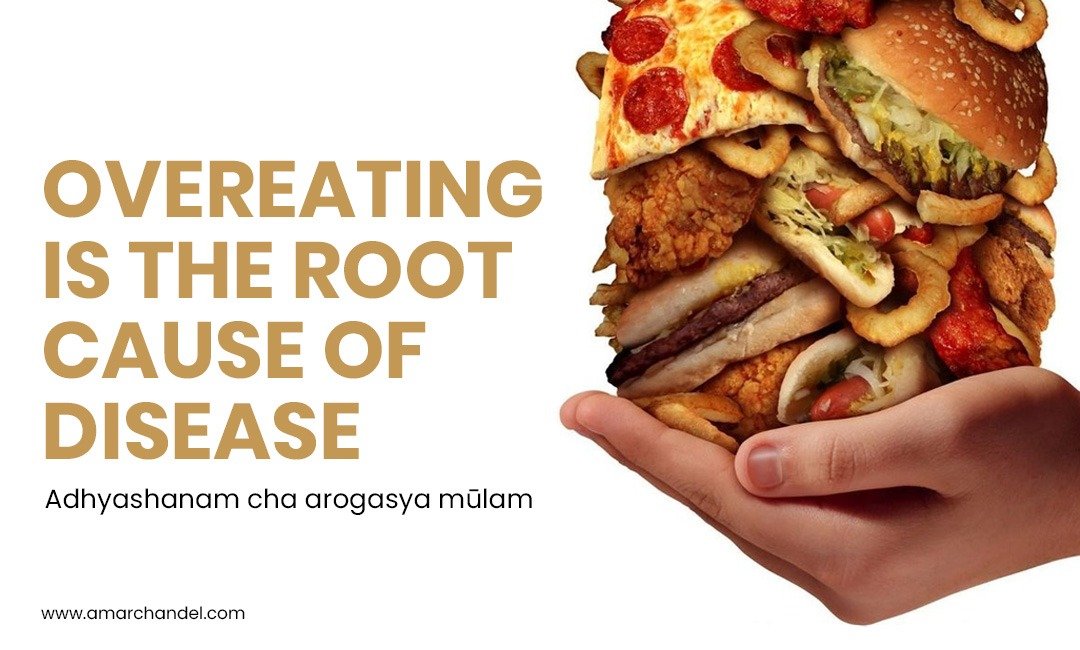“Adhyashanam cha arogasya mūlam” translates as “Overeating is the root cause of disease.” This saying is a profound teaching from the Charaka Samhita, one of the primary texts of Ayurveda. The essence of this statement revolves around the idea that consuming more food than the body can properly digest leads to various health problems. The ancient wisdom of Ayurveda highlights the importance of moderation in eating, which has been corroborated by modern scientific research in terms of digestion, metabolism, and overall health.
Understanding Overeating in Ayurveda
In Ayurveda, the concept of digestion is central to health and well-being. It is not just the quantity or quality of food that matters, but also the timing and balance in eating. Agni, or digestive fire, is the cornerstone of digestive health. Agni is believed to be the force that transforms food into usable energy, and the efficiency of this process is directly impacted by how much food is consumed at one time.
When a person eats too much, the digestive fire (Agni) becomes overwhelmed. The body is unable to process the food effectively, and this leads to the accumulation of undigested food particles, which in Ayurveda is referred to as Ama. Ama is a toxic substance that can block the proper flow of energy in the body, leading to disease. According to Ayurveda, Ama is the root cause of all ailments, and overeating is one of the primary causes of its accumulation.
The Concept of Agni (Digestive Fire)
Agni plays a vital role in Ayurveda, as it governs the digestive process. When Agni is strong and balanced, digestion occurs efficiently, nutrients are absorbed properly, and waste products are eliminated from the body. However, if the Agni is weak or disturbed, digestion becomes sluggish, leading to various health issues.
Overeating directly impairs Agni because the digestive fire can only handle a certain amount of food at one time. If the amount of food exceeds the digestive capacity, the excess food cannot be properly broken down, which leads to the formation of Ama (toxins). This can cause various digestive disorders like bloating, indigestion, heartburn, and even chronic conditions such as constipation or diarrhea.
Key Points on Agni and Digestion in Ayurveda:
• Strong Agni: Good digestion, energy, and health.
• Weak Agni: Poor digestion, accumulation of toxins, and disease.
• Excessive Food Intake: Overburdened Agni, leading to undigested food (Ama), which causes disease.
The Physiology of Overeating
The modern understanding of overeating can be explained through the lens of digestive physiology. The process of digestion begins in the mouth with enzymes breaking down food. The stomach then further breaks down food with the help of stomach acids and digestive enzymes, followed by the small intestine, where nutrients are absorbed into the bloodstream. When a person overeats, the stomach becomes distended, and the digestive process is compromised.
Excessive food intake puts pressure on the stomach, slowing the digestive process. The body produces more digestive juices to break down the excess food, but it cannot keep up with the amount consumed. As a result, the food may sit in the stomach for longer than necessary, causing discomfort, bloating, and indigestion. Over time, this may lead to more serious digestive issues, including acid reflux, gastritis, and even more chronic conditions like irritable bowel syndrome (IBS).
The Impact of Overeating on Metabolism:
• Insulin Resistance: Overeating can lead to increased fat storage in the body, causing insulin resistance, a precursor to type 2 diabetes.
• Increased Inflammation: Excessive food intake can contribute to systemic inflammation, which is linked to a wide range of health conditions, including cardiovascular disease, arthritis, and metabolic syndrome.
• Altered Gut Microbiome: Overeating can disrupt the delicate balance of bacteria in the gut, leading to dysbiosis, which can affect digestion, immunity, and mental health.

The Psychological Aspects of Overeating
Ayurveda recognises that emotional and psychological states play a significant role in overeating. Stress, anxiety, and emotional imbalance often drive individuals to overeat, especially foods that are not conducive to health. In such cases, the mind becomes disconnected from the body’s natural cues for hunger and satiety. Emotional eating, therefore, becomes a way to cope with mental distress, but it exacerbates the problem of overeating and its associated consequences.
Modern psychology and neuroscience support the Ayurvedic understanding of overeating as a response to emotional and psychological triggers. The reward system in the brain, when activated by the consumption of food, particularly highly palatable foods, creates a cycle where the brain seeks comfort from overeating, leading to long-term patterns of unhealthy eating behaviours. This pattern may also contribute to food addiction, where the brain’s reward circuits become desensitised to food, leading to the need for larger quantities to achieve the same sense of satisfaction.
Overeating and the Mind-Body Connection:
• Ayurvedic View: The mind (Manas) and body (Sharira) are interconnected. When the mind is disturbed, it often leads to excess consumption of food, which disturbs the body’s natural rhythm.
• Modern View: Stress and anxiety activate the hypothalamic-pituitary-adrenal (HPA) axis, leading to increased hunger and cravings for unhealthy food, which can cause overeating.
The Long-Term Effects of Overeating on Health
Over time, overeating leads to a host of chronic health issues, as the body is consistently overburdened with excess food that it cannot digest. Some of the long-term effects of overeating include:
- Obesity and Metabolic Syndrome:
Overeating is one of the primary contributors to obesity. Consuming more food than the body needs leads to an excess of calories, which are stored as fat. Over time, this leads to weight gain and obesity, a condition that is associated with numerous health problems such as high blood pressure, high cholesterol, and insulin resistance.
Obesity is also closely linked to metabolic syndrome, a cluster of conditions that increase the risk of heart disease, stroke, and diabetes. Metabolic syndrome is often caused by poor dietary habits, including overeating, and can result in chronic inflammation, hormonal imbalances, and impaired fat metabolism.
- Cardiovascular Diseases:
Overeating increases the risk of cardiovascular diseases, including hypertension, atherosclerosis, and heart disease. Excessive consumption of food, particularly unhealthy fats, leads to the accumulation of fat in the arteries, causing blockages that reduce blood flow to the heart. This can result in conditions like high blood pressure, stroke, and heart attack.
- Gastrointestinal Disorders:
Chronic overeating leads to several gastrointestinal disorders, including indigestion, acid reflux, and gastroesophageal reflux disease (GERD). Overeating can overwhelm the digestive system, causing irritation of the stomach lining and increasing the production of stomach acid, leading to discomfort and potential long-term damage.
- Insulin Resistance and Diabetes:
As mentioned earlier, overeating contributes to the development of insulin resistance, where the body’s cells become less responsive to insulin. This impairs the body’s ability to regulate blood sugar levels and can eventually lead to the development of type 2 diabetes. Chronic overeating, particularly of foods high in refined carbohydrates and unhealthy fats, can promote the accumulation of visceral fat, which is closely linked to insulin resistance.
- Mental Health Issues:
There is a significant connection between overeating and mental health disorders, including depression and anxiety. Overeating, particularly of high-sugar and high-fat foods, can cause fluctuations in blood sugar levels, leading to mood swings, irritability, and fatigue. Moreover, the guilt and shame associated with overeating can contribute to feelings of anxiety and depression, creating a vicious cycle of emotional eating.
Ayurvedic Remedies for Overeating
Ayurveda offers several remedies and practices to counteract the harmful effects of overeating. These include:
- Mindful Eating:
Mindful eating is a practice in which one pays full attention to the eating experience, including the sights, smells, textures, and flavours of food. It encourages individuals to eat slowly and savor each bite, which helps prevent overeating and promotes better digestion.
- Proper Portion Control:
In Ayurveda, it is recommended to eat only until one is three-quarters full. This allows the digestive system to function optimally without overloading it. Portion control also helps maintain a balanced intake of nutrients and prevents the formation of Ama.
- Fasting and Detoxification:
Occasional fasting, as recommended in Ayurveda, helps to cleanse the digestive system and rejuvenate Agni. By allowing the digestive system to rest and recover, fasting promotes the proper elimination of Ama and supports overall health.
- Herbal Remedies:
Ayurveda uses various herbs to support digestion and combat the effects of overeating. Herbs like Triphala, Ginger, Cumin, and Fennel help in digestion, reduce bloating, and support detoxification.
- Regular Exercise:
Exercise is an essential part of the Ayurvedic approach to health. Physical activity stimulates digestion, boosts metabolism, and helps regulate appetite. It also improves circulation and enhances the body’s ability to process food.
Conclusion
The saying “Adhyashanam cha arogasya mūlam”, meaning “Overeating is the root cause of disease,” highlights an enduring truth that transcends time. Whether viewed through the lens of ancient Ayurvedic wisdom or modern scientific understanding, overeating is undeniably linked to a myriad of health problems. In Ayurveda, the focus on Agni, digestion, and the balance between the mind and body offers a holistic approach to managing overeating and preventing disease. By practicing moderation, mindful eating, and incorporating Ayurvedic remedies, individuals can safeguard their health and prevent the negative effects of overeating, thereby fostering long-term wellness.

